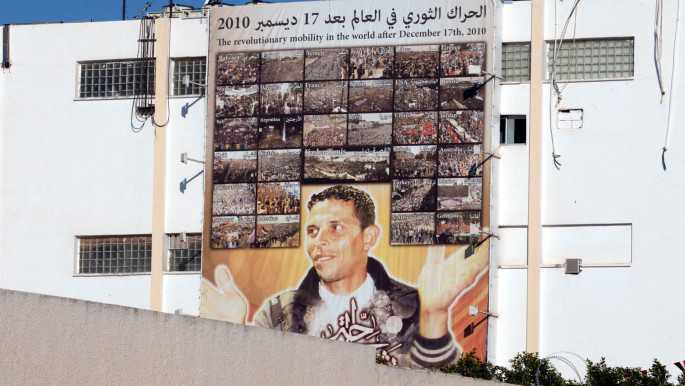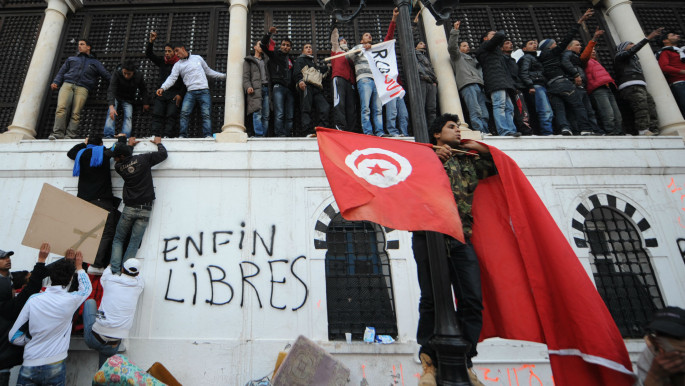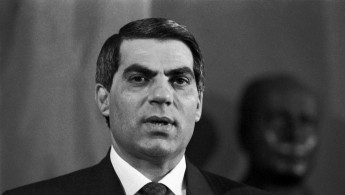Ben Ali: Tunisian dictator whose ouster sparked Arab Spring dies in exile
Former Tunisian President Zine El-Abidine Ben Ali, the first Arab leader to be toppled in a wave of street protests that swept the region in 2011, has died aged 83.
His death came just days after Tunisia went to the polls in the country's second free elections since the longtime autocrat's ouster, following a successful transition to democracy.
His spectacular downfall ignited similar uprisings against other authoritarian leaders across the Arab region, which led to the removal of Egypt's Hosni Mubarak and Libya's Muammar Gaddafi in the same year.
Reports emerged last week that Ben Ali had been hospitalised in Jeddah after years of treatment for prostate cancer, with his lawyer confirming his death.
He is survived by his wife Leila Trabelsi and their three children Mohamed, Halima and Nesrine.
He also has three daughters from his first marriage - Ghazwa, Dorsaf and Cyrine.
 |
Ben Ali ruled Tunisia with an iron fist for 23 years before fleeing to Saudi Arabia in January 2011 where he lived until his death |  |
Ben Ali ruled Tunisia with an iron fist for 23 years before fleeing to Saudi Arabia in January 2011 where he lived until his death.
In mid-2012, Ben Ali was sentenced in absentia to life in jail for his role in the deaths of protesters during the uprising that ousted him.
Read more: What's changed in eight years? Tunisians mark revolution anniversary
Relatively little was heard about the former president's life in Saudi Arabia. A relative said he had suffered a stroke in early 2011 and is believed to have been in ill health since.
Rise to power
Ben Ali was born into a modest family in the east-central town of Hammam-Sousse on 3 September, 1936 when Tunisia was still a French protectorate.
He studied at military academies in both France and the US and was appointed minister for national security in 1985, moving up to the interior ministry the following year and the post of prime minister in 1987.
In a bloodless coup on 7 November 1987, Ben Ali seized power from then-president-for-life Habib Bourguiba, the founder of modern-day Tunisia who set the Muslim country on a pro-Western course after independence from France in 1956.
Ben Ali removed Bourguiba from office for "incompetence," saying he had become too old, senile and sick to rule.
"I needed to re-establish the rule of law," Ben Ali told a French television channel in 1988. "The president was ill and his inner circle was harmful."
 |
|
| Mohamed Bouazizi, a Tunisian street vendor who set himself on fire on 17 December 2010, became a catalyst for the Tunisian Revolution. [Getty] |
Consolidating authoritarian rule
Ben Ali promised that his leadership would "open the horizons to a truly democratic and evolved political life", scrapping the title of "president for life" created by Bourguiba and limiting the number of presidential terms to three.
But after a brief period of reforms early on, Tunisia's political evolution stopped.
Most opposition parties were illegal. Opponents were jailed or fled into exile. Amnesty International said authorities infiltrated human rights groups and harassed dissenters.
Reporters Without Borders branded Ben Ali a "press predator" who controlled the media.
Despite promising a move towards democracy, in May 2002 he held a referendum to change the constitution so he could serve a fourth term. A second such change then allowed for an unlimited number of mandates.
Ben Ali consistently won elections by large margins.
In 2009 he was re-elected to a fifth five-year term with 89 percent of the vote. He had warned political opponents they would face legal retaliation if they questioned the vote's legitimacy.
He was fond of telling foreign leaders that Tunisia, a major mass-market tourist destination for Europeans, "does not have any lessons to receive" about human rights.
But rights groups regularly condemned his government, which they said held hundreds of political prisoners.
Corruption was endemic under Ben Ali, whose close circle - especially his wife's family - had an iron grip on the economy.
 |
|
| Ben Ali ruled Tunisia with an iron fist for 23 years before fleeing to Saudi Arabia in January 2011. [Getty] |
Revolution
The revolution that toppled him was triggered in December 2010 by the self-immolation of a young man, Mohamed Bouazizi, in the poverty-stricken centre of the country.
The snowballing uprising first focused on joblessness but took on a political dimension, fuelled by anger after a crackdown that left scores dead.
Ben Ali made several attempts at conciliation including the creation of 300,000 new jobs, the sacking of his interior minister, the release of detained demonstrators and a pledge to not stand for re-election in 2014.
But the mood was unforgiving and he eventually fled into exile in January 2011 with his wife Leila Trabelsi, his downfall triggering revolts across the Arab world.
In the year that followed his downfall, Ben Ali was sentenced in absentia to fines and time in prison in several cases on charges including misappropriating public funds and ordering the torture of army officers who allegedly led a coup attempt against him.
In Tunisia, people slowly became indifferent to the fate of the ex-strongman, even in the turbulent aftermath of the revolution.
Agencies contributed to this report.





 Follow the Middle East's top stories in English at The New Arab on Google News
Follow the Middle East's top stories in English at The New Arab on Google News
![Both Hamas and the Palestinian Authority welcomed the ICC arrest warrants [Getty]](/sites/default/files/styles/image_330x185/public/2024-11/GettyImages-2178351173.jpg?h=199d8c1f&itok=TV858iVg)

